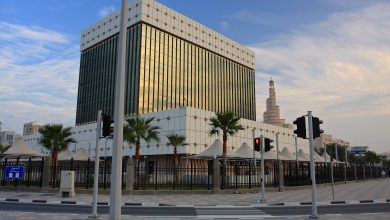Qatar committed to green investment and climate smart infrastructure
قطر ملتزمة بالاستثمار البيئي والبنية التحتية الذكية مناخياً
The Peninsula
Doha: Qatar has raised the bar in sustainability as it will deliver the mega sporting event FIFA World Cup 2022 in a sustainable manner. The country’s investment in green and climate smart infrastructure is also a positive step that will accelerate the pace of carbon neutrality, said an expert during an online event.
Hamad Bin Khalifa University (HBKU) recently organised an online event titled ‘How Qatar is Delivering the First Carbon-Neutral World Cup’ which explored Qatar’s journey as it gears to host the first carbon-neutral FIFA World Cup. Experts discussed the importance of carbon neutral World Cup and current practical efforts that Qatar is taking to deliver sustainable and transformational legacy in this sporting event worldwide.
Damilola S Olawuyi, Professor and UNESCO Chair on Environmental Law and Sustainable Development and Associate Dean of Research at the College of Law at HBKU said: “A carbon neutral World Cup ensures that it does not lead to increase in current levels of greenhouse gas emissions that cause climate change. Scientific studies show that the problem of climate change will create significant social, economic, and societal disruptions in many parts of the world. So, it is crucial that everything we do in all countries of the world must lead to eradicating or mitigating the problem of climate change.
“It is quite inspirational that Qatar has committed to ensure that this World Cup is going to be about carbon neutrality. Firstly, Qatar has released the comprehensive sustainability strategy that ensures the World Cup does not exacerbate environmental concerns. Secondly, to invest in green projects that will offset any remaining emissions which may arise and that way you are ensuring that greenhouse emissions do not increase during the World Cup and ensuring that you have invested significantly in the projects that will immediately neutralise those emissions,” he added.
Investment in green and climate smart infrastructure is a positive step that will accelerate the pace of carbon neutrality that the country is trying to achieve, said Olawuyi.
“Qatar has raised the bar when it comes to sustainability into the delivery of sporting events and four key areas are being priortised in Qatar including sustainable and green infrastructure, delivery of green jobs and procurements, the measurement of the emission level and tracking them, and raising awareness through sustainability and education,” he noted.
Responding to a query about the impact of the World Cup 2022 on local environment and sustainability, Dr. Danyel Reiche, Visiting Research Fellow at the Center for International and Regional Studies and Associate Professor at Georgetown University in Qatar said: “We have seen remarkable progress in environmentally friendly infrastructure namely the stadiums which all have sustainability certification. Also, the public transportation aims for becoming fully electric by 2030, so we will have many electric buses for the World Cup”.
He added: “A number of remarkable progresses has been made on the supply side as the World Cup sets new standards when it comes to sustainability of its infrastructure”.
Dr. Mohammed Ayoub, Senior Scientist at the Qatar Environment and Energy Research Institute discussed the relationship between carbon neutrality and sustainability. “Carbon neutral is an element of sustainability and Qatar has moved towards more sustainable approach to the World Cup and is introducing additional elements of sustainability at the national level,” he said.
The main pledges that the FIFA and the State of Qatar – the Supreme Committee for Delivery and Legacy has made are to raise awareness among key stakeholders who are delivering the World Cup both in terms of construction of stadiums and World Cup facilities as well as delivery and post-delivery of the World Cup. The three main elements are to measure, mitigate and offset carbon dioxide or greenhouse gas emissions associate with the delivery of World Cup, the officials reiterated.
ذا بينينسولا
الدوحة: رفعت قطر مستوى الاستدامة حيث ستقدم الحدث الرياضي الضخم كأس العالم لكرة القدم 2022 بطريقة مستدامة. حيث قال أحد الخبراء خلال حدث عبر الإنترنت إن استثمار البلاد في البنية التحتية الخضراء والمناخية يعد أيضاً خطوة إيجابية من شأنها تسريع وتيرة حيادية الكربون.
وقد نظمت جامعة حمد بن خليفة مؤخراً حدثاً عبر الإنترنت بعنوان “كيف تقدم قطر أول بطولة لكأس العالم المحايدة للكربون” والتي استكشفت رحلة قطر وهي تستعد لاستضافة أول بطولة لكأس العالم لكرة القدم خالية من انبعاثات الكربون. وقد ناقش الخبراء أهمية بطولة كأس العالم الخالية من الكربون والجهود العملية الحالية التي تبذلها قطر لتقديم إرث مستدام وتحولي في هذا الحدث الرياضي في جميع أنحاء العالم.
وقال داميلولا إس أولاوي، أستاذ كرسي اليونسكو للقانون البيئي والتنمية المستدامة والعميد المشارك للبحوث في كلية القانون بجامعة حمد بن خليفة: “تضمن بطولة كأس العالم الخالية من الكربون ألا تؤدي إلى زيادة المستويات الحالية لانبعاثات غازات الاحتباس الحراري التي تسبب تغير المناخ. وتظهر الدراسات العلمية أن مشكلة تغير المناخ ستخلق اضطرابات اجتماعية واقتصادية واجتماعية كبيرة في أجزاء كثيرة من العالم. لذلك، من المهم أن يؤدي كل ما نقوم به في جميع دول العالم إلى القضاء على مشكلة تغير المناخ أو التخفيف من حدتها. وإن إلتزام قطر بضمان تمحور بطولة كأس العالم هذه حول الحياد الكربوني هو لأمر ملهم للغاية فأولاً، أصدرت قطر استراتيجية الاستدامة الشاملة التي تضمن أن كأس العالم لا يؤدي إلى تفاقم المخاوف البيئية. ثانياً، استثمرت في المشاريع الخضراء التي من شأنها تعويض أي انبعاثات متبقية، وبهذه الطريقة ضمنت عدم زيادة انبعاثات الاحتباس الحراري خلال كأس العالم وضمنت أنك قد استثمرت بشكل كبير في المشاريع التي ستعمل على تحييد هذه الانبعاثات على الفور”.
وقال أولاوي إن الاستثمار في البنية التحتية الخضراء والمناخية خطوة إيجابية من شأنها تسريع وتيرة الحياد الكربوني الذي تحاول الدولة تحقيقه.
“لقد رفعت قطر المستوى عندما يتعلق الأمر بالاستدامة في تقديم الأحداث الرياضية، وتم تحديد أربعة مجالات رئيسية في قطر بما في ذلك البنية التحتية المستدامة والخضراء، وتوفير الوظائف والمشتريات الخضراء، وقياس مستوى الانبعاثات وتتبعها، و رفع الوعي من خلال الاستدامة والتعليم “.
وقال الدكتور دانييل رايش، زميل باحث زائر في مركز الدراسات الدولية والإقليمية وأستاذ مشارك في جامعة جورجتاون في قطر رداً على استفسار حول تأثير كأس العالم 2022 على البيئة المحلية والاستدامة : “لقد شهدنا تقدماً ملحوظاً” في البنية التحتية الصديقة للبيئة أي الملاعب التي حصلت جميعها على شهادات الاستدامة. كما تهدف وسائل النقل العام إلى أن تصبح كهربائية بالكامل بحلول عام 2030، لذلك سيكون لدينا العديد من الحافلات الكهربائية لكأس العالم “.
وأضاف: “لقد تم إحراز تقدم ملحوظ في جانب العرض حيث وضع كأس العالم معايير جديدة عندما يتعلق الأمر باستدامة بنيتها التحتية”.
وناقش الدكتور محمد أيوب، كبير العلماء في معهد قطر لبحوث البيئة والطاقة، العلاقة بين حيادية الكربون والاستدامة. وقال: “الكربون المحايد هو عنصر من عناصر الاستدامة وقد اتجهت قطر نحو نهج أكثر استدامة لكأس العالم لتقدم عناصر إضافية للاستدامة على المستوى الوطني”.
وإن التعهدات الرئيسية التي قطعها FIFA واللجنة العليا للمشاريع والإرث في دولة قطر هي لرفع مستوى الوعي بين أالمسؤولين الرئيسيين الذين يقدمون كأس العالم من حيث بناء الملاعب ومرافق كأس العالم وكذلك قبل وبعد كأس العالم.
وكرر المسؤولون التأكيد على أن العناصر الرئيسية الثلاثة هي قياس وتخفيف وتعويض انبعاثات ثاني أكسيد الكربون أو غازات الاحتباس الحراري المرتبطة باستضافة كأس العالم.




